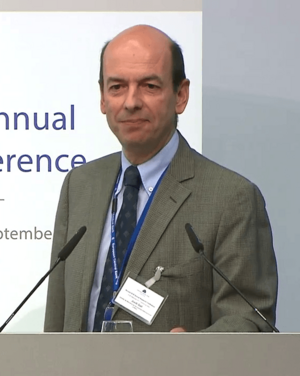Jordi Galí facts for kids
Quick facts for kids
Jordi Galí
|
|
|---|---|

Galí in 2017
|
|
| Born | January 4, 1961 Barcelona, Spain
|
| Institution | Universitat Pompeu Fabra (2001–) CREI (1999–) Barcelona Graduate School of Economics (2006–) New York University (1994–01) Columbia University (1989–94) |
| Field | Macroeconomics |
| School or tradition |
New Keynesian economics |
| Alma mater | MIT (Ph.D. 1989) |
| Doctoral advisor |
Olivier Blanchard |
| Influences | Mark Gertler |
| Awards | Yrjö Jahnsson Award (2005) |
| Information at IDEAS / RePEc | |
Jordi Galí (born January 4, 1961) is a Spanish macroeconomist. He is known as a very important person in the field of New Keynesian macroeconomics. This is a way of thinking about how big economies work.
He works as a Senior Researcher at CREI (Centre de Recerca en Economia Internacional). He is also a Professor at Universitat Pompeu Fabra and the Barcelona School of Economics. Before moving to Barcelona, he taught at Columbia University and New York University. He earned his Ph.D. from MIT in 1989.
Contents
What Jordi Galí Studies
Jordi Galí's work focuses on why economies have "ups and downs." These are called business cycles. He also studies how central banks should manage money. This is known as monetary policy. He often uses a method called time series analysis to look at economic data over time.
How Countries Manage Money
Galí and his colleagues, Richard Clarida and Mark Gertler, studied how countries set their monetary policy. They found that many countries today follow something called the Taylor rule. This rule helps central banks decide interest rates. They also found that leaders in the 1970s did not follow this rule.
Setting Interest Rates
Another big part of Galí's research is about how central banks should set interest rates. In some simple economic models, keeping inflation steady also helps keep the economy stable. This idea is sometimes called the 'divine coincidence'.
However, Galí and Olivier Blanchard showed that this "divine coincidence" isn't always true. In more realistic models, central banks might have to choose. They might have to decide between keeping prices stable or keeping the economy running smoothly.
Productivity and Jobs
Jordi Galí is also famous for his research on labour productivity. He found that when businesses become more efficient, fewer people might be needed for jobs. This idea goes against some older economic theories.
However, Galí says it fits well with newer New Keynesian ideas. The ways he uses statistics for this research are still discussed by other economists.
Books by Jordi Galí
In 2008, Jordi Galí wrote a book called Monetary Policy, Inflation, and the Business Cycle. This book helps students learn about New Keynesian economic models. It also explains what these models mean for how central banks manage money. The book is used in many university courses. A new version of the book was released in 2015.
Awards and Recognition
Jordi Galí has received many important awards for his work.
Yrjö Jahnsson Award
In 2005, he won the Yrjö Jahnsson Award. This award is given to top European economists. He shared the prize with Timothy Besley. This award recognized his important work in New Keynesian macroeconomics.
Other Honors
Thomson Reuters has listed him as a "citation laureate." This means he is considered a possible future winner of the Nobel Prize in Economics. In 2024, he received the BBVA Foundation Frontiers of Knowledge Award. This award was for his work in economics and finance.
He also became a member of the Academia Europaea in 2012.
See also
 In Spanish: Jordi Galí para niños
In Spanish: Jordi Galí para niños
- Barcelona Graduate School of Economics
 | Emma Amos |
 | Edward Mitchell Bannister |
 | Larry D. Alexander |
 | Ernie Barnes |

